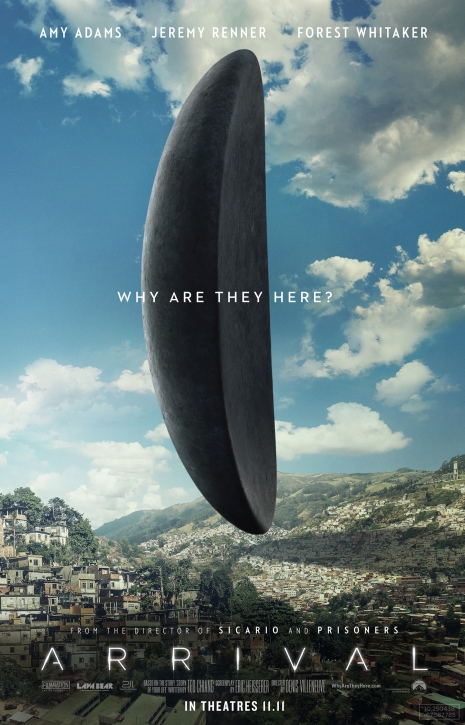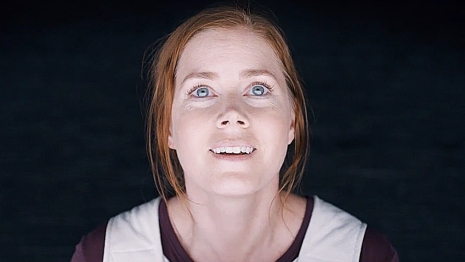
I’m back. Remember me? It’s time for another one of my unpopular opinion pieces, and this time it’s about everyone’s favorite 2016 artsy-fartsy sci-fi hit (and Oscar contender) Arrival. The film has gotten nearly unanimous critical praise, and if that wasn’t enough to raise your suspicions, how about the constant use of that critical kiss-of-death word “refreshing”? Were they all paid to use that specific word? Makes you wonder, huh? But before I get into the meat of this essay I’m going to offer up two definitions to bear in mind whilst reading:
1.) Pretentious: attempting to impress by affecting greater importance than is actually present.
2.) Artsploitation: the exploitation of an art-house cinema audience, especially in regard to the critical merits of a film.
Thanks to Google for number one and as for number two, it’s my own coinage. Artsploitation refers, like other exploitation genre tags, to a particular audience’s desire to consume a particular kind of film regardless of its quality. In the case of “art-house” cinema, this means that as long as a film looks pretty or conforms to the audience’s notion of “artistic” merit—most often translating to a level of incomprehensibility that one viewer can use to claim a superior “understanding” over others—said “art” film can then be excused of all its flaws. Regardless of how bad they are or how poorly it may conform to other essential tenets of “good” cinema such as writing, editing, acting and directing.*
If you ask me, Arrival fits both of these definitions down to a tee.

“God Niall, why do you have to keep shitting on the things that everyone else loves?!” I can hear an imagined reader crying out from the deepest recesses of my ego. But this is the thing: I love genre movies. I love them in their own right, in-and-of themselves. There is no shame in genre cinema for me, there is no shame in gleefully enjoying well-executed action, in impressive explosions or a well-crafted monster, in camp humor and in over-the-top bad acting.
What pisses me off is directors/producers/writers who are unwilling to interact with genre works on their own terms. There is a palpable sense of fear and shame from these arty “updates” and “fresh retellings,” as if the director is afraid of getting tarred with the “genre film director” brush and losing their artistic cachet, or even of stooping to the level of less-acclaimed directors who work within the actual genre. An auteur placing themselves above a genre, not within it, never, ever works. Instead of making a decent movie based on a true understanding of what makes a genre film work, they instead force their own artistic aspirations on the audience, missing the point of why audiences love genre films in the first place.
Now, Arrival may not be the worst contender—and I’m a big enough man to admit that there were some moments I kinda enjoyed—but it IS guilty of these crimes, nonetheless. I have divided my critiques up into vague categories for clarity, and need I mention: SPOILERS AHEAD! Okay, here we go…

THE FILM’S SUPPOSED AND WIDELY DISCUSSED “ORIGINALITY”
There’s only one shot in the entire film that stayed with me, and if you have seen the film, you’ll know the one: the slow-motion, aerial approach to the alien ship via a mountain range with cascading clouds. And that shot, indeed, is breathtaking. If only the rest of the film could have stayed at this level of artistry. Unfortunately, it didn’t. So it is surprising to hear seasoned critics gushing over the supposed “originality” of this film, when it’s really not that original at all. The story is a slightly modified take on Contact, the tone of detached wonderment is cribbed from 2001: A Space Odyssey, the alien ships are lifted from the opening of Prometheus, and the aliens themselves are your bog-standard “tentacled” creations that recall both the mighty Cthulhu and the not-so-mighty Karg and Konos from The Simpsons. None of these are in any way obscure references, so it puzzles me as to why they have not been acknowledged more honestly. But it’s not just Arrival‘s concepts that lack originality: it’s the film’s execution.
DENIS VILLENEUVE
Denis Villeneuve attracts a lot of critical praise for his directorial work. This is the first film of his I have actually seen, so I guess I was expecting a lot. And in the end I couldn’t help but feel utterly disappointed at a film whose central conceit is the power of new forms of language, but which itself leans so heavily on so many tired-ass cinematic cliches. The flashback/forwards/dead daughter “memory” sequences in particular rely on the worst kind of Hallmark-esque imagery. You know the type, it’s on page one of the playbook titled “How To Crassly Manipulate Feelings Of Warm Sentimentality in Your All-Too-Willing-to-be-Manipulated Audience.” Turn on your television right now and you will be bombarded this within kind of imagery in hundreds, no thousands, of adverts: tiny hands brushing through the long grass of a sunny meadow, colourful wellingtons splashing the clear waters of a babbling brook, a laughing baby’s face shot in floaty shallow focus and obscured by lens flare. An old couple holding hands on the porch. All that was missing was a breathy-voiced, piano-ballad cover version of some trashy dance-pop (“Can’t Get You Out Of My Head” perhaps?) Arrival uses a visual language so cliched that I kept expecting to see the Vodaphone or Ikea logo materialise in the corner of the screen, with details of the great new offers available at my local branch. In effect, the director has taken a lazy visual short-cut to the audience’s emotions. And it’s not the only one.
JEREMY RENNER
This is a film that is full of lazy shortcuts. Jeremy Renner’s character, the mathematician Donnelly, serves one, and really only one, purpose in this film. And no, it is not to be the father of Adams’ as-yet-unborn-but-soon-to-be-dead child (realistically, as he never appears in these scenes, that could have been any one of the male cast, or even someone Adams hasn’t even met yet). No, Renner is only there for one thing and this is blatant plot exposition. From his opening scene on the helicopter, where he clues us in a bit more to Adams’ “mysterious” character by reading aloud passages from her own book (eyeroll), to his work in the lab “solving” the alien code (which, in this one brief sequence appears to exist on a 3-D plane, only to revert back to 2-D as and when the plot needs it). But the most offensive scene, and the moment Arrival took a nose-dive into awfulness for me, is his one-off voiceover info-dump that arrives half-way through the film. Seriously, that bit. And I mean seriously: had that sequence been turned in for a creative writing or screenwriting course it would be an automatic fail. If it had appeared in any other film, one directed by a non-critical darling, say, or perhaps a megabucks blockbuster like Independence Day 2, it would rightly be laughed off the screen. It is the epitome of “tell-don’t-show” writing. And yes, sometimes you can’t “show” everything, but that doesn’t excuse your “tell” a lack of artistry… It also interjects into the story what should have been a hugely important narrative voice, but then discards that voice instantly. It’s a cheap gimmick. All these glowing reviews and NOT ONE has mentioned that massive feat of terrible writing?! Oh yeah, but I forgot. Arrival is a serious film. It’s bringing the art-house to the masses, and a brain to the sci-fi genre. You don’t have to concern yourself with those annoying little things like terrible writing.
LIL MS. PLOT DEVICE (AKA THE “DEAD-NOT-DEAD-SHE’S-NOT-BORN-YET CHILD”)
The dying child trope is one of the worst kinds of emotional manipulation in film. And I’m just going to lay it on the line here: Arrival is one of the worst offenders of emotional manipulation I have ever seen. Putting a child character in mortal danger can be very effective when used imaginatively or with truly subversive intent. But that is not the case here. The use of the dying child trope in Arrival is so very cheap and offensive BECAUSE of how seriously we are asked to take this (supposedly deep) narrative concoction. To paraphrase George Lucas: “Emotionally involving an audience is easy. Get a little girl and have some screenwriter give her cancer.” It is yet another lazy shortcut: Arrival relies so heavily on the daughter-with-cancer subplot because otherwise we have no emotional connection with these under-written characters. The only thing the audience knows about the daughter is a) the identity of her mother and b) that she is dead. Can anyone who has seen this film even tell me her name without looking it up? I get that these scenes and those ideas hit a lot of people right in the feels, especially those in the audience with children of their own but that is explicitly what they are supposed to do: MANIPULATE YOU. Pull at your heart strings so you feel some affinity for a film that cannot create that affinity on its own merit. The final reveal that these are not, in fact, flashbacks but *gasp* flash forwards just served to add insult to injury. So you’re telling me that, after all this time, all these scenes and all the heavy-handed emoting you have forced on me, that this girl might not even exist?! GET. THE. FUCK. OUTTA. HERE.

THE LINEAR TIME vs. FREE WILL CONUNDRUM
“Oh, but she DOES exist!” I can hear someone cry. “The aliens said so!” And here we get to the gaping hole of logic the film tries to divert its audience from noticing. Anyone with any interest in sci-fi, or fantasy, or really just any story with an aspect of time-travel, will know that knowledge-of-things-yet-to-happen can have a huge effect on the world of that story, for both good and bad (usually bad). This is very simple Back To The Future/The Time Machine stuff. It ties into the multiverse theory, where life is a series of infinite choices, and there is a corresponding number of universes out there somewhere where each of our choices have been made differently. Yet somehow these ideas, which hinge on the concept of free will and being able to make different choices based on information you have been given, do not apply to Arrival. The aliens show Adams her future child with Renner, who will die of cancer, yet there is precious little suggestion that Adams might decide NOT to have that child with Renner. It is simply a given that she WILL have this child with this man and said child WILL die.
Now, I have heard some defenders of Arrival claim that the story is told from a pre-determinist point-of-view (i.e. there is no such thing as free will, there is only one universal timeline, everything has been already set in stone) but I’m not buying it. Not even for one second. Because the film itself can’t even stick to this straight-forward, basic logic. That the future is NOT pre-determined in the story is proven by the flash-forward sequence of Adams meeting the Chinese General at the future UN summit. In this scene Adams has no memory of her previous, world-saving conversation with the General (which, let’s face it, would be quite odd as it, quite literally, SAVED THE WORLD!) This scene, where the vital information is fresh to Adams, squarely puts to rest a pre-determinist reading of the film, as well as a linear time theory, as it plainly shows that events of the past have not happened in this particular (alternate) future. So, by this definition, Adams’ and Renner’s future-cancer-trope-child does not actually exist in hardcore, concrete terms. It is merely one of a myriad of alternate futures, avoidable if Adams chooses not to have a child, or chooses a different man to have a child with, or chooses not to have a child specifically with Renner. When viewed from this perspective it becomes painfully clear that this cancer-trope child is, in fact, just an act of extreme emotional manipulation by the story-tellers. Because the only place she DEFINITELY exists is in the minds and pens of some awfully lazy screenwriters.
THE UNDERLYING MESSAGE (EMOTIONAL)
Look, I get it. I get that the underlying emotional question being asked in this film, in an elliptical way, is: if you could do it all over again, even the painful, shitty parts, would you? (Allowing Adams to see her future child’s death IS effectively asking her to “do it again,” but or real this time.) It’s an age-old question and the basis for some great stories. But that is not just what the film is asking/telling us. What it is also suggesting is: “You have no choice, there is nothing you could have done about those shitty things, and at the end of the day they are absolutely NOT your fault, either.” And that is utterly despicable.
We the audience are asked to believe that Amy Adams’ character is a master of communication, yet towards the end of the film we learn that it was her lack of communication with her husband that ended their marriage. Okay. I mean, these things happen. People grow apart, etc., etc. But that’s not what happened here. No, she knowingly withheld information (literally life-or-death information) from her life-partner/father of her child, about that child! This is NOT a minor character flaw, this is not something “cute” or “kooky” which should be just accepted or waved away. This woman ruins her primary relationship, causes massive mental harm to her spouse and untold other family members, and deliberately brings a child into an avoidable life of pain and suffering and premature death, all to satisfy her own personal, emotional need. The film seeks to raise her to the level of hero but this is NOT a heroic act in ANY WAY. The braver thing to do would be to inform her partner of what she knows, everything, and then face the consequences of sharing that information, either still together or apart. And how this act of unbelievable selfishness squares with the film’s themes of communication and co-operation? It doesn’t. Like I said, I get it. But I am absolutely NOT buying it.

THE UNDERLYING MESSAGE (THEMATIC)
The thematic message of Arrival, which is distinct from the emotional message, is fairly simple: communication is crucial, as co-operation between the world’s nations is vital to the planet’s survival. And this is where we get to the crux of my piece, and my contention that Arrival is far from the intelligent and acutely observed sci-fi character drama many critics claim it is, instead being a pretentious artsploitation piece that wraps itself up in lofty ideals but, upon closer examination, is about as deep as tissue paper. The film’s engagement with its own ideas is only on the surface level (an easily definable trait of being pretentious) and it fails to bear these ideas out in the execution of its own story. Basically, Arrival claims to be about global collaboration for a peaceful future, but turns out to be just another film where (yet again) a lone, white American saves the day while the rest of the planet devolves into squabbling and almost starting World War 3 (and I’ve not even mentioned how some of the other territories the ships have landed near are much better equipped for decoding non-linear, symbolic languages than the West). If you want a modern sci-fi film where this message is actually acted out, and not just paid lip service to, try Pacific Rim.
*Oh, and if anyone dares to comment here saying: “Duh it WASN’T art-house! It was released in major cinemas!!” don’t bother. Stop kidding yourselves: art-house cinema is not restricted to playing at specifically art-house venues, just as other genre films aren’t. Arrival is art-house cinema to its core, though granted it is art-house cinema that is trying to perform a feat of crossover with the sci-fi genre. It wants to be the arthouse film sci-fi heads can like or the sci-fi film art movie heads can like, but really it doesn’t satisfy either. It’s for those people who say they LOVE metal after hearing “Enter Sandman” on a mixtape.
Previously on Dangerous Minds:
My unpopular opinion: I just don’t get all the ‘Stranger Things’ hype. Anyone else with me?